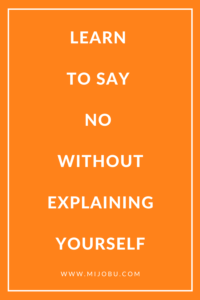
How to Say NO and Not Feel Guilty
The word no can be one of the hardest words to use in personal or professional situations. Saying the word, no, can be liberating and display a feeling of independence and freedom. Being free to say no without guilt is a necessary skill that is needed to avoid the burden of self-doubt and guilt because you want to decline an invitation. But how do you say no and not feel guilty?
Say no and not feel guilty by:
- Being concise.
- Being clear.
- Being kind.
- Not offering an explanation.
- Offering an alternative.
We can get so caught up in our head about how the other person interprets the word no, but we need to get caught up in how we want to prioritize our lives. If you do not prioritize your life, somebody else will. Saying no gives you the freedom to decide how you want to prioritize your time.
Sometimes we say yes to things to avoid an awkward feeling because most people hate hearing the word no. We say yes to things because we:
• Don’t want to seem rude.
• Don’t want to appear selfish.
• Don’t want to let people down.
• Don’t want to miss out on an opportunity.
We cheat ourselves when we commit to things, we know we should’ve said no to from the beginning. Treat saying the word no like a muscle by exercising it daily. Once you become comfortable with using any of the techniques in this article, you will be able to say no and feel free to move your life forward in the order you desire.
1. Be concise when you say no.
When saying no, there is no reason to over explain and provide long drawn-out reasons. Providing your life story and the follow-up book is not required when telling someone no. You do not owe an explanation for saying no, however, avoid saying too much when you’re going to say no.
For example, a friend extends an invitation to attend a party during the same weekend you planned to relax and spoil yourself, saying no is simple. ‘I appreciate the invitation to your party but unfortunately I already have commitments for the weekend.’
This approach of saying no allows you to show appreciation for the invitation while also communicating you are already committed and leaves you not feeling guilty. You decided to make yourself a priority that weekend and that does not require you to explain that in detail to anyone else.
2. Be clear when saying no.

When you are going to say no its important to say it with authority and be clear about your intentions. If you know that you do not intend to attend a party after receiving an invitation, speak clearly about how you will not attend. When you look for excuses, you are really giving up or giving yourself time to change your mind later. If you do not want to attend the party, just say so.
Say what you mean and mean what you say.
If you receive an invitation to attend a party but you have another conflicting obligation or simply do not want to attend, be clear when you decline the invitation. For example, a response like, ‘I appreciate the invitation to your party but unfortunately I am unable to attend.’
Being clear does not require you provide a detailed explanation; it just requires you be clear about your intentions. If the other person thinks you plan to attend the party and you know you will not attend, it means you were not clear when you said no.
3. Be kind when saying no.
When saying no to someone, its important to be kind. Notice I did not say nice. Being nice only takes the other person into consideration without thinking about yourself. Being kind takes the other person and yourself into consideration, so you speak your truth.
Just because you have decided to say no, it does not mean you need to be rude. It also does not mean you need to burn bridges to decline an invitation. You have the option to graciously decline an invitation while still maintaining your character.
For example, if someone invites you to a lunch that you are not available to attend, be kind when you say no. Say something like, ‘I appreciate you inviting me out to lunch but unfortunately I have a previous commitment and am unavailable.’ Using this type of response shows you appreciate the invitation but at the same time communicates you are unable to attend. You were not a jerk and you stood up for yourself.
4. Do not offer an explanation when saying no.
Saying no does not come with a condition that requires you to provide an explanation. Explaining yourself when you do not need or want to, can leave you vulnerable to telling a lie instead of just saying no. A lie has a bad habit of following you because it requires you tell more lies to protect the original lie. A simple no is more than enough.
You have a right to say no to anything you choose to without the need to justify your reason for saying no. The only person that needs to understand the why behind your no is you. You can say thank you followed by no or just no. Bottom line is you do not have to explain yourself.
5. Offer an alternative to no.
Sometimes no means never and other times no means not right now. A good way to say no not right now is to offer an alternative. An alternative becomes another opportunity to engage with the individual that extended an invitation to you. This approach allows you to provide your no without feeling guilty.
For example, if a friend invited you to an event but you were unavailable, you could provide an alternative to connect at another time. A response like, ‘Thank you for the invitation but unfortunately I can’t attend. How about we get together for brunch next week?’ is a great way to offer an alternative. The alternative allowed you to say no and not feel guilty.
Alternatives give you another opportunity to explore a no not right now.
You must get great at saying no. Make a habit out of only committing yourself to people and things when you choose to not due to an obligation. Choosing to say no to opportunities or invitations is important when prioritizing your life.
Saying no does not make you feel guilty when you are comfortable saying no honestly without providing excuses while maintaining your character. Own when you say no and mean it. Avoid talking yourself out of saying no when you know it is the best decision you can make for yourself. You are responsible for you.






